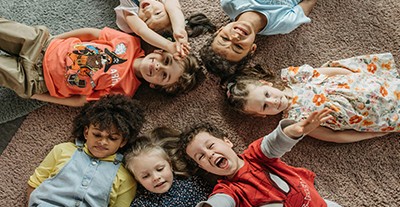Yulunga means playing in the language of the Kamilaroi (Gamori) people of northwestern New South Wales. Suitable for preschool children, Yulunga can be used as an educational resource and as a guide to inclusive, structured sport within communities, developed by the Australian Sports Commission.
Moka Bandi
Background
- This guessing game was observed being played by young and old at Cape Bedford in North Queensland.
Language
- The game is called moka bandi, which means ‘to think’ or ‘remember’ in the Kaurna language of South Australia. No local word for the game was found for the people from North Queensland, and the name selected recognises that this type of activity was played in various parts of Australia.
Description
- A guessing game similar to ‘I spy’
Gameplay and basic rules
- One of the group of players may notice a new
- The other players take turns guessing what it is—a flower just in bloom, a bird half-hidden in a bush, a tussock of grass uprooted, or whatever—and taking care to look in quite a different direction — anywhere but in the correct direction — says, ‘What am I thinking of?’ The players laugh when the correct guess is made. Hints may be given if necessary.
Further details: Moka Bandi
Segur Etug
Background
- This is a guessing game that originates from Mer Island in the Torres Strait region.
Language
- The game is named ‘segur etug' for the Meryam Mir language (Torres Strait Islands) word for ‘play.’
Description
- A number-guessing game.
Gameplay and basic rules
- One player takes a quantity of small objects and places them in a closed hand or cup.
- The other players attempt to guess the number. The player who is correct has the next turn. If no player guesses correctly, the player has another turn.
Further Details: Segur Etug
Wabbyn
Background
- The Injibandi people of Western Australia had many guessing games. Wabbagunja kambong, wabbyn, ngabbungee jenarnung, and kambugenjin were some of the names of their guessing games. Guessing games were often played around the campfire after the day’s hunting was over. Women might also play these guessing games among themselves while returning from a root-gathering expedition.
Language
- In the language of the Noongar people of the Perth area: Bo’kul wabberding koolongur They're playing; there are the children.
Description
- This is a game very similar to the ‘animal, vegetable, and mineral’ game known to most children.
Gameplay and basic rules
- A player who has been away all day on a ‘hunting expedition’ begins by saying, ‘I saw something today, very funny. Who can tell me what it was?
- The guessing continues until the correct guess is made or the players ‘give in.’ Players take turns.
Further Details: Wabbyn
Walbiri
Background
- A memory-testing game was played by the Walbiri children of central Australia. Players were required to recall sand-drawing maps of the locality after watching for a short time. This was a game that helped the children remember and identify the surrounding topography.
Language
- This game is named for the Walbiri people observed playing a memory game.
Description
- This is a memory-testing game using various objects.
Gameplay and basic rules
- A circle (5–10 meters in diameter) is drawn on the ground, and around it are placed a number (10–30) of sticks and stones (or other objects), with each ‘representing’ prominent local landmarks in the area.
- After studying the arrangement of the objects for a time, the players turn their backs on the circle. With their backs to the arrangement, the first player calls an object at a given point and continues to call each object on the line around the circle until he or she calls incorrectly. When this occurs, the next player continues.
Further Details: Walbiri
Reference:
Yulunga Traditional Indigenous Games, Australian Government, Australian Sports Commission
